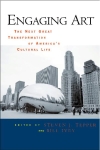« Not Really Laughing | Main | Musicians and engagement »
June 18, 2007
More Reader Comments
by Douglas McLennanChanging the dress code would be a very easy was to convey personality to an audience, but that can't happen until classical music overcomes the ghost of Beethoven and realize that it's in the 21st century. Audiences would be much more likely to give classical music a try -- and give classical music sustained attention -- if orchestras did away with the high culture pretense and dressed more honestly. read more
- John Stoehr
Looking at government funding solely through a federal lens distorts any arguments for the arts towards broad-stroke meaninglessness. NEA funding isn't insubstantial, but in the grand scheme of things, it's largely symbolic. On the more important state and local level, though, the argument is an easy one: a healthy arts community increases the "livability" of a city or state, making it more attractive to possible residents/workers/businesses, etc. And while it's easy to roll one's eyes at yet another economic-impact study, having data that says the arts are providing this many jobs in your district/county/ward and pumping this much money into your constituents' businesses is speaking in politicians' language. read more
- Matthew
Strangely, I have also noticed that the large majority of full-time orchestra musicians don't often make other kinds of music, even if they have the free time or money to do so. Orchestras seem to sap the desire for creativity almost completely out of them. In fact, many creative musicians avoid orchestras like a plague, but they usually have few alternatives for making a living. read more
- William Osborne
One cannot discuss the issue of arts participation (attendance, appreciation, engagement...) without talking about the level of education which, by all standards, has been rather abysmal in this country for over a generation. My father, who teaches European History at one of the best American universities, has recently given his history(!) majors a test to gage their general cultural awareness. In response to the question "What is cubism?" one of the students wrote "Cubism was the war between USA and Spain for the independence of Cuba." I suppose it is a "chicken-and-egg" sort of dilemma but one simply cannot ignore it. read more
- Nastya
There are scores, if not hundreds of ideas and programs, the arts might employ to expand audience participation - some which would likely fall flat on their face, others of which might actually put bodies in seats or otherwise change the dynamics, but most of them will have some cost invovled, and thus most of them will never be tried, because there isn't the money, as Mr. Osborne rightly points out, to even adequately pay competitive salaries to orchestra members, let alone allow the arts to provide public access at prices the public can afford or engage in basic marketing. And those orchestra member salaries and the funds to allow those orchestras to drop ticket prices to the point that more people will attend, aren't likely to just appear magically from the sky. read more
- Barry Hessenius
In today's environment where few children and few adults have any familiarity with our music, it is no longer sufficient for orchestras to play great music well and offer some music education for children. Orchestras must embrace an additional mission of creating a demand for our music. read more
- Jack McAuliffe
Most people only hear a symphony as the soundtrack backing up a movie plot. It is background music that underscores the emotional movement of the story - subtly touching the hearts and minds of the audience unconsciously. Is this a bad thing? Music, though of course it can stand on its own, is fantastic (dare I say even better?) at supporting other mediums. So combining other forms of entertainment with the symphony experience can be a dynamic and exciting way to touch those hearts and minds that may need a little extra stimulation. Combining visual media, dance, singing, acting, even athletic interests can create a more exciting experience for someone who doesn't understand why you would just sit and look at a bunch of people playing instruments for an entire evening. read more
- Paul Pement
The public never stopped being engaged with music it could receive as communicative. It has been the institutional crowd which has so codified the analytical basis for everything which has turned things upside down for them as far as audiences go. They are further decieved when they get together in their little mutual admiration cliques on campus, and hogwash each other into thinking their "music" is the next, future thing. This is because we now have teachers who simply have no idea what they are talking about - that is why real composers are turning inward and offering up serious and communicative art to a public which not only understands, but appreciates it. As for those who sneer at whatever is "popular," who cares about their "music?" read more
- John Graham
To take part in this discussion click on the "comments" link below any post and write your comment. To see all the reader comments, go here.
Posted by mclennan at June 18, 2007 6:53 PM




